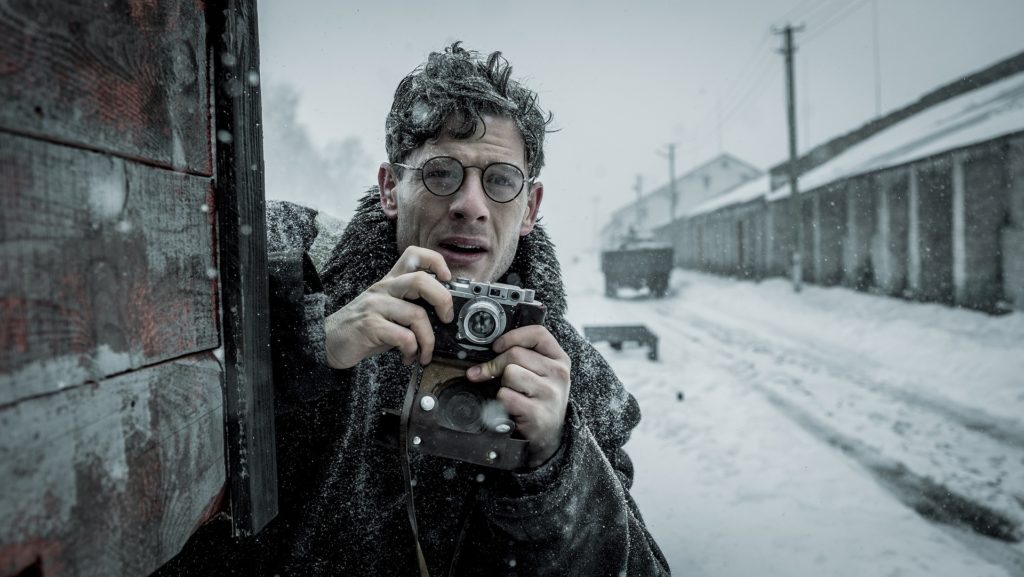Agnieszka Holland has made over 30 films, winning awards including the Golden Globe and Silver Bear, and has been nominated for a BAFTA and an Emmy. Her films “In Darkness,” “Europa Europa,” and “Bittere Ernte” (“Angry Harvest”) were all nominated for Academy Awards.
“Mr. Jones” will premiere at the 2019 Berlin International Film Festival on February 10.
W&H: Describe the film for us in your own words.
AH: Based on true events, it is the story of a young and smart Welsh journalist, Gareth Jones, who travels to Soviet Russia in the hope of interviewing Stalin. He feels something is wrong there and tries to figure out the problem. He succeeds in sneaking to the Ukraine and discovers massive, man-made famine, which is killing millions. He tried to alert the world but was discredited by a powerful New York Times correspondent and by Western politicians.
It is a story about fake news, corruption of media, cowardice of politicians, the indifference of nations, and — ultimately — the courage of an individual.
W&H: What drew you to this story?
AH: I wanted to give justice to one of the worst – and practically unknown – genocides. I felt that the story is incredibly relevant. The world we’re living in [is starting] to look like the worst periods in the 20th century.
I loved the main character: his courage, honesty, and deep understanding of the duty of journalism.
W&H: What do you want people to think about when they are leaving the theater?
AH: I want them to think — to feel, and to try to understand why this story is so important. But first I want them to open their hearts and minds.
W&H: What was the biggest challenge in making the film?
AH: How to express the things you cannot express: the fear, the suffering, and the death of millions of innocents. The sequence of Gareth’s journey through empty villages in the Ukraine was very challenging. We wanted to find a very discreet, simple way to show this terrible reality. We wanted it to be very evocative and powerful by using the whispers, not the cries.
W&H: How did you get your film funded? Share some insights into how you got the film made.
AH: I think my producers can explain it better than I can. We’ve been supported by public funds in Poland, Ukraine, and Scotland by different city agencies and post-production facilities. Private investors from Canada topped up the budget.
W&H: What inspired you to become a filmmaker?
AH: It was a long time ago, in the mid ’60s. I was in high school and really inspired by the cinema of those times, which included several New Waves, and a lot of great filmmakers: Robert Bresson, Andrzej Wajda, Federico Fellini, Michelangelo Antonioni, Ingmar Bergman, Agnès Varda, Jean-Luc Godard, Akira Kurosawa, Andrei Tarkovsky, and many, many others. Cinema was innovative and exciting then.
I wanted to tell the stories — to express my visual skills and to tell people what to do. Being a film director seemed like the best vocation.
W&H: What’s the best and worst advice you’ve received?
AH: The best: Be yourself and remember that the audience is a necessary part of your movie.
The worst: Try to please.
W&H: What advice do you have for other female directors?
AH: Be yourself. Don’t pretend that you know something when you don’t. Remember your duties to your crew and actors. They need to trust you and be inspired by you.
W&H: Name your favorite woman-directed film and why.
AH: Agnès Varda is just the best — she’s such a great filmmaker. I especially love “Happiness,” one of her early movies. It is very delicate and cruel at the same time.
W&H: It’s been a little over a year since the reckoning in Hollywood and the global film industry began. What differences have you noticed since the#MeToo and #TimesUp movements launched?
AH: More and more people understand how important and valuable women’s points of view are, and the right to tell our stories — and have them heard. It is only beginning, but I hope that we, women, the majority of humanity, will be not treated like the minority anymore.







